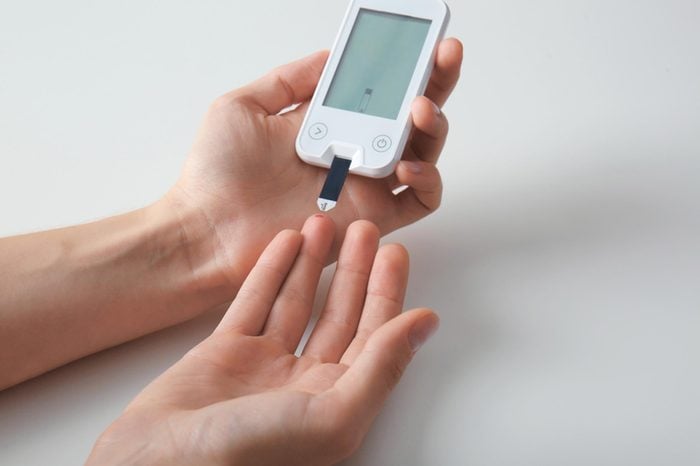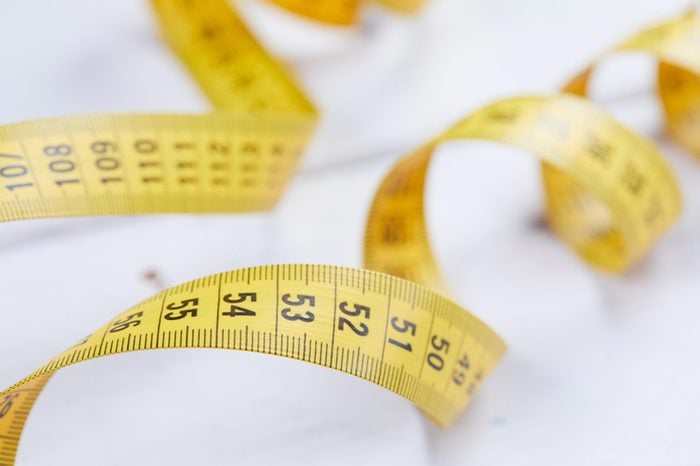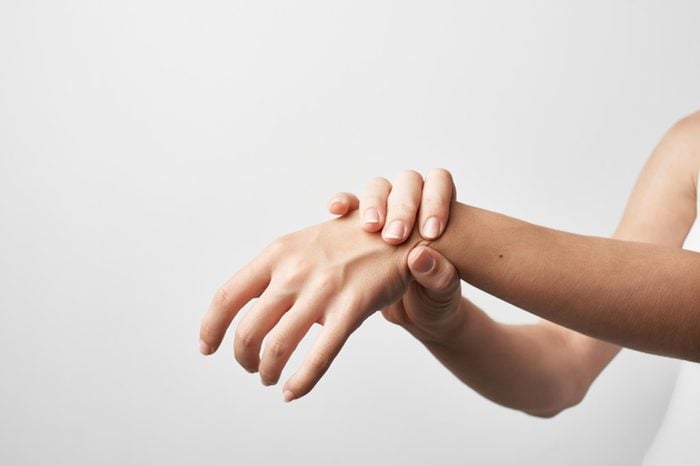Who needs cereal, eggs, and bacon in the a.m. when your tummy doesn't even rumble till near lunchtime? You'd be surprised.
12 Things That Happen to Your Body When You Skip Breakfast

You have a greater risk of heart disease
Some 31 million Americans are breakfast skippers, studies show. Some are trying to cut calories, some are too busy during the morning rush, and others say they just don’t feel hungry. But despite some reports, the research overwhelmingly shows that eating a good breakfast is an important part of a healthy lifestyle. A study from Harvard University found that men who skipped breakfast had a 27 percent greater risk of heart attack or heart disease than those who dug in. Although they haven’t pinpointed a direct cause, researchers suspect that remaining in a fasting state for longer is stressful and makes the body work harder, causing metabolic changes. “The changes in hormones to help maintain blood sugar levels and the trend toward weight gain in patients who skip breakfast has been linked to heart disease,” says Christian J. Gastelum, MD, an endocrinologist at PIH Health in Whittier, California. These changes lead to plaque buildup in the arteries, upping your chances of heart problems.

You’re more likely to get diabetes
Skipping that bowl of oatmeal or yogurt parfait could mess with your blood sugar. Another Harvard study found that women who regularly didn’t eat breakfast had a 20 percent increased risk of developing type 2 diabetes. “Skipping the morning meal is linked with impaired glucose tolerance and that is further associated with the development of prediabetes and diabetes,” Dr. Gastelum says. The theory is the irregular blood sugar spikes that occur when we fast for a long time and then eat a lot because we’re hungry put a strain on the body, which can lead to insulin resistance.

You may gain weight
If you’re trying to lose weight, it would seem that the less you eat, the more pounds you’d drop, right? But that’s not exactly the case. Although research is mixed on whether eating breakfast has a direct effect on weight loss, the link between skipping breakfast and weight gain has been shown. “One theory is that people who eat breakfast are more likely to practice lifestyle behaviors associated with an ideal body weight and good health,” says Shannon R. Weston, MPH, a certified diabetes educator at UTHealth School of Nursing in Houston. “Another theory is that people who skip breakfast tend to overeat at subsequent meals, consuming the majority of calories during the most sedentary hours of the day.” Dr. Gastelum says that some of his patients don’t realize they take in more calories in one sitting than in three planned meals. “Patients who frequently skip meals believing that they are eating less or consuming fewer calories are often wrong,” he says. “They tend to have a rubber band effect on their calorie intake—they skip breakfast and then overeat at lunch.” Here are 20 more hidden reasons your diet isn’t working.

Your metabolism may slow down
When you skip meals, your body stops working as fast in order to conserve fuel. “The body will slow its basal metabolic rate to compensate for calorie restriction,” Dr. Gastelum says. Plus, in the morning your metabolism has already been slow during sleep. “Prolonged fasting will further reduce the body’s willingness to burn calories and impact the amount of adipose [fat] tissue that’s lost.” Although the results of a recent study dispute this thinking, the same research also showed more calories burned during morning exercise, as well as more stable blood sugar later in the day, when the participants ate breakfast. So, the morning meal does seem to have an impact on the body’s metabolic processes.

You may get stupid
Not eating breakfast can have an effect on brain health as well. Because your noggin runs on glucose, the drop in blood sugar from a long fasting state can affect your cognitive function. “Skipping breakfast is a missed opportunity to provide adequate nutrients to the brain, especially after an overnight fast,” Weston says. Studies have shown that school children do better on tests when they’ve had breakfast. “Because dietary carbohydrate breaks down into glucose, it is important to get the right amount of carbohydrates for breakfast to optimize cognitive focus and memory,” she says. But don’t go reaching for sugary pastries—choose complex carbs like whole grains, plus protein like eggs, and healthy fat like avocado. Check out these 27 healthy breakfast recipes you can try today.

You’ll get “hangry”
When you’re hungry, you’re also apt to get angry more easily, and so avoiding your morning meal may make you grumpy. This is especially true if you’re skipping breakfast because you’re in a rush, and not because you truly don’t feel like eating. One study from the United Kingdom showed that men who had eaten breakfast had a more positive mood at the start of the test session, and felt calmer afterward, than those who hadn’t eaten breakfast. Weston says the drop in blood sugar caused by skipping a meal causes irritability, along with fatigue and headache that can further worsen your mood. “Serotonin and dopamine, also known as neurotransmitters, are chemicals produced in the brain to regulate feelings and mood,” Weston says. “There is a connection between food intake and the balance of neurotransmitters produced by the brain. Skipping meals puts stress on the body and stress affects dopamine and serotonin levels.” On the flip side, eating regularly supports happy feelings.

Your energy will dip
Another reason skipping breakfast is linked to weight gain is that you have less energy for working out. If you’re feeling sluggish, you’re not going to want to hit the gym—and if you do, you may poop out in the middle of your session. Plus, once you finish a morning workout you’ll need to eat to refuel—so to get through the morning with a workout and no breakfast will leave you extra drained. According to information from the University of Wisconsin, breakfast should give you 25 percent of your daily energy, including high fiber and protein for fuel. If you don’t have time to cook eggs or make oatmeal, have a quick protein shake. Try some of these high-protein breakfast ideas.

Your breath stinks
Wait, how can not eating foods that could potentially give you bad breath still leave you with bad breath? U.S. News and World Report explains that eating breakfast stimulates saliva production and helps scrub your tongue of bacteria, which can make your morning breath more tolerable. Skipping breakfast ensures that stinky bacteria continue to thrive in your mouth. Dr. Mervyn Druian of the London Centre for Cosmetic Dentistry told DailyMail.com that the best fresh fruit and a glass of water is the most effective breakfast for washing away that bacteria.

Your cortisol levels may increase
A 2014 study done by researchers at the University of California, Davis, showed that women who skipped breakfast had higher cortisol levels during various tests throughout the day than women who are breakfast, and the “skippers” also had higher blood pressure readings. What’s more, women in both groups reported feeling similar amounts of chronic stress, regardless of their actual cortisol levels. Researchers believe that the combination of skipping breakfast and experiencing chronic stress could increase one’s risk for cardiometabolic syndrome. Just make sure you avoid the 15 breakfast foods everyone should stop eating.

You could develop chronic inflammation
In a small 2017 study, researchers at the University of Hohenheim in Germany took three-days’ worth of blood samples from 17 healthy adults. On one day, they skipped breakfast; on another, they skipped dinner; and on yet another, they ate three normal meals. After comparing the samples, researchers found that people who skipped breakfast had higher glucose concentrations and increased fat oxidation, meaning their bodies broke down more stored fat. Because of this, the study suggests that people who skip breakfast may develop metabolic inflexibility, meaning their bodies would have difficulty switching their source of fuel from glucose to fat, and vice versa. In the long-term, this could lead to chronic inflammation and potentially raise their risk of type 2 diabetes and obesity.

Your periods may get worse
Ladies, it may be in your best interest to make time for breakfast every morning. A 2009 study conducted by Japanese researchers analyzed the eating habits of 315 female college students. The students who didn’t eat breakfast had poor general health, painful period cramps, and higher incidents of irregular periods. Don’t miss these food hacks for a healthier breakfast.

You’ll have more cravings later
A protein-packed start can help manage your appetite throughout the day. “Studies have shown that eating a breakfast with a substantial amount of protein (around 20 grams) has an impact on nutritional choices the rest of the day,” Weston says. “Because dietary protein suppresses appetite and provides satiety between meals, people who eat a high-protein breakfast tend to eat fewer calories overall during the day compared to people who eat a high-carbohydrate breakfast.” In general, we make worse food choices when we’re hungry, so feeling satisfied after breakfast can put you on the right track. But, if you are truly not hungry in the morning, it’s OK to listen to your body. Instead, “try eating something light, such as a piece of fruit with nut butter or no-sugar-added yogurt,” Weston says. Next, check out these17 healthy breakfast mistakes you probably make every morning.
